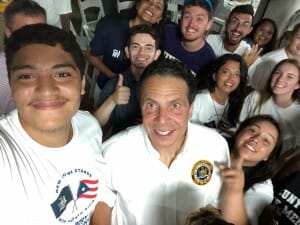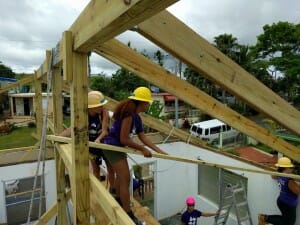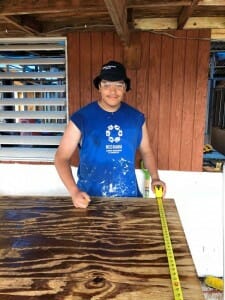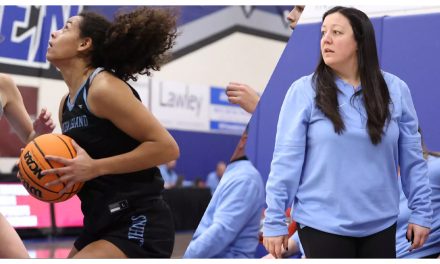For Brendali Nunez and Mohamed Abouseria, the anniversary of Hurricane Maria, which struck Dominica and Puerto Rico one year ago today, resonates personally. As volunteers through the CUNY Service Corps, the College of Staten Island students helped rebuild homes destroyed by the storm—and doing so changed their lives.
“It changed everything,” Nunez said. “I feel so different. I can’t even explain it to my friends and family who weren’t with me in Puerto Rico.”
“It did change the way I think about things,” Abouseria said. “I don’t waste time as much. When I saw that I could be using my time to help people, I realized when I helped it meant a lot to people. It made me want to help people more, too.”
On Sept. 20, 2017, Hurricane Maria devastated Dominica and Puerto Rico. As many as 5,000 people died as a result of the storm and total losses from the storm reached almost $100 billion. Maria raged for 16 hours and virtually all of Puerto Rico’s three million residents were affected: electricity was cut off for weeks, even months, in some areas, and basic necessities soon ran out.
Abouseria and Nunez were among seven College of Staten Island students who helped rebuild homes heavily damaged by the storm. CUNY Service Corps paired them with organizations that implemented programs to help families rebuild their houses. In their cases, they were paired with NECHAMA and All Hands and Heart.
“I was totally excited to have our students participate,” said Cheryl Barzey who manages the College’s branch of CUNY Service Corps. “The students have been totally committed. When there is a need, they are available for the challenges.”
About 70 students graduate from the one-year program annually, Barzey said. The program emphasizes professional development and corps members participate in monthly workshops to improve their skills. Applications for the program are accepted in January.
The students are matched with organizations that aim to address a variety of issues. Typical assignments last twenty-four weeks over two semesters. Participants are required to work 10-12 hours per week (at a rate of $15.00 an hour).
The students who responded to Hurricane Maria rebuilding spent two weeks in Puerto Rico.
“We would wake up at 6:30 every day, eat breakfast, get ready, then put all the tools in the van,” Nunez recalled. “There were two types of homes—those with CGI (corrugated galvanized iron) roofs and those with concrete roofs. CGI is very hard to cut and it’s dangerous because it’s super sharp. So we had to be very careful.
“We would use power tools—construction workers. We felt bad-ass and it was awesome.”
Abouseria echoed her sentiments.
“We worked from 8 to 4,” he said. “It was hard work. And I would be very tired. But you’d see the homeowners smile, really appreciating what you did, and that made it worth it. It was definitely worth it.”

New York Governor Andrew Cuomo posed with CUNY Service Corps volunteers during a visit to Puerto Rico in August 2018.
Although Nunez learned construction skills as part of the program, Abouseria’s previous construction experience allowed him to assume a leadership role. The experience also taught both Nunez and Abouseria a great deal about Puerto Rico’s history, they said.
But for both students, the experience was as spiritually rewarding and life-affirming as it was an opportunity to help people practically.
“I’m a Muslim and me going there was like a command from my religion,” Abouseria said. “In the Qu’ran it says, ‘If you save one life it’s like saving all of humanity.’ That made it very meaningful to me.”
Nunez said the experience had led her to rethink her life plans. Instead of going directly to a graduate program, she’s considering the Peace Corps.
“I feel like my spiritual self has evolved in some way and I want to continue on that road,” Nunez said. “I even applied to go back in January. I’m going back there for two weeks.”

















